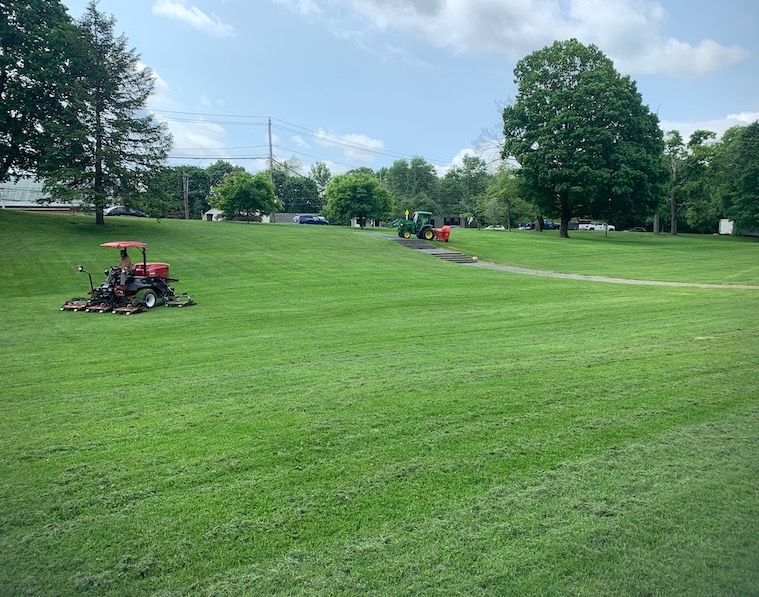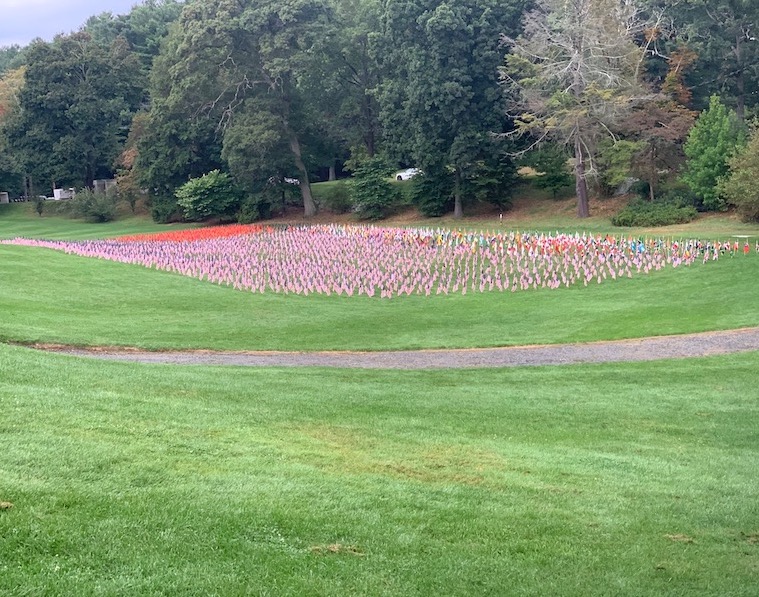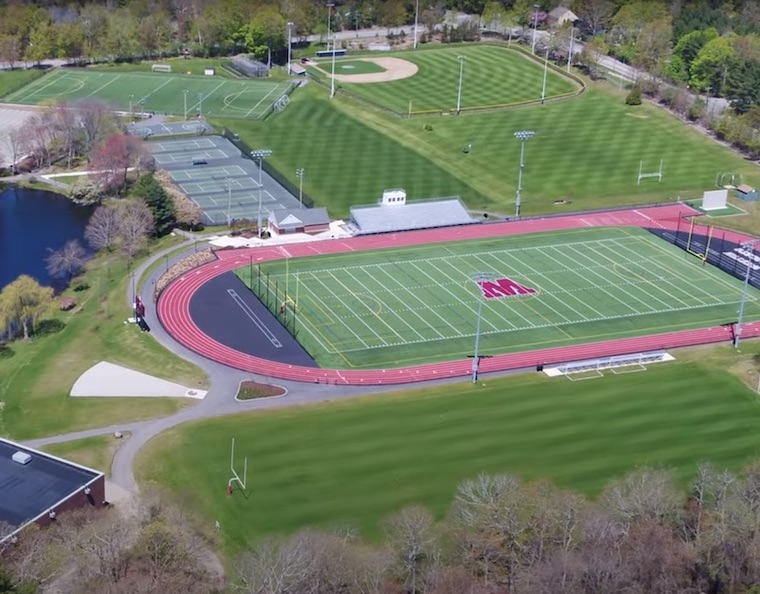In this edition of the SportsField Management Interview, we meet Ben Polimer. Ben has been the Fields and Grounds Coordinator in Weston, Mass., since January 2016 and was the town’s first in this new position. Previously, he worked at a private school in central Massachusetts and at a private tennis club outside Boston. He is past president of the New England Sports Turf Managers Association, and been involved with STMA since 2005. He was awarded George Toma Golden Rake award in 2015 and the President’s Award for Leadership in 2014 and 2020.
SportsField Management (SFM): Please tell us about your role as Fields & Grounds Coordinator for the Town of Weston, Mass., the fields/facilities that you manage, and your crews/staff.
Polimer: My role here in Weston was created in 2015, and I was their first turf manager in early 2016. My responsibilities include managing all green space for the town. That includes school and recreation fields, lawns, landscapes, grounds and trees around town buildings including all schools. That includes about 50 acres of maintained turfgrass. Our schools are separated into two campuses, with the high school and middle school together with two synthetic fields and 11 natural grass fields. The other campus has three elementary schools with playgrounds and recess fields, school administration building (with historic, mature trees), community center, public library and a soccer complex. I have a school grounds staff of three and a recreation staff of one. With small staffing, we manage all the daily operations, but we contract out most agronomic work like aeration, bulk fertilization, etc.
SFM: What attracted you to the turfgrass industry, and what was your career path in the industry?
Polimer: I was an athlete growing up, and I knew this industry was a way to stay in sports. My dad was a volunteer head groundskeeper for the local Little League Baseball complex for many years, and I worked summers for him. I went to Delaware Valley University for my turfgrass degree. I had internships in Minor League Baseball and for a sports turf construction/renovation company. I was hired for my first job out of college by Mike Buras at the Longwood Cricket Club, helping to manage 19 clay tennis courts and 25 poa annua courts, and the associated beautiful grounds. After Longwood, I was the sports turf manager at Worcester Academy, a private school in central Massachusetts. I managed three athletic campuses for multiple sports, and I was the project manager for a synthetic field construction project. After six years there, I landed the job currently in Weston.

SFM: Who would you consider your mentors, and/or what is the best advice you have received?
Polimer: Certainly, my mentors are my dad and Mike Buras. My dad got me into the industry reading books and watching old VHS videos from Floyd Perry! Mike was my first boss out of college, and really pushed me to think critically and use my knowledge. Mike has produced great turf mangers over the years with his intern and mentoring program. The best advice I received was from Mike: He always said to ask questions – question everything and everyone.
SFM: What would you say are the biggest accomplishments of your career and/or what are you most proud to have achieved?
Polimer: That’s tough to say. My George Toma Golden Rake Award in 2015 was certainly a highlight, and my two STMA President’s Awards for Leadership in 2014 and 2020. I am proud of how I left the athletic fields in Worcester. They were really in fantastic shape. I tried to make those fields the best conditions I could. I have really enjoyed my time with NESTMA – now being the past president. It is a fantastic organization and I made lifelong friends and relationships.
SFM: What has the past year has been like for you and your staff? What types of challenges have you faced? What have you learned? And what is your outlook for 2021 and beyond?
Polimer: 2020 was certainly tough for many. Overall, we did well here. No sports took place in the spring and most of the summer, and we had limited school and youth sports in the fall. We did not change our agronomic plans at all during the year, and we certainly had good turfgrass going into the winter. I do wish I was more aggressive with some projects. We could have renovated some fields if I knew they were going to be used so little. None of our grounds staff have been sick, and we do a very thorough disinfecting each day – from hand tools to tractors and vehicles. A lot of our focus is managing the grounds around the schools. In the fall, a lot of classes were outside using our spacious grounds, which was great but posed a little more difficulty maintaining them. Snow removal is always challenging, and with COVID, they expanded out the areas for school drop off and pickups, so that, in turn, has expanded our needs for snow removal and ice control. I’m honestly not sure how 2021 is going to look. I think we will have organized sports in the spring, but I’m not sure if that means full fields.

SFM: You recently received recognition from the New England Sports Turf Managers Association, as outgoing president, for your service to the association; and you also recently received a 2020 STMA President’s Award for your service to national STMA. Congratulations on those achievements. How did you first get involved at the chapter and national STMA levels? And what is your advice to other industry professionals regarding the value of belonging to industry associations, as well as the importance of giving back to the industry through service?
Polimer: I first got involved in both NESTMA and STMA though Mike Buras. He pushed his managers to be involved in both organizations. My first work with NESTMA was helping rebuild fields for a field makeover project that the organization did, that, in turn, led to board service for many years, president for two years and now past president. My first STMA conference was in 2005, and I was excited then to learn as much as I could from the industry’s best. I still feel that way when I get the opportunity to go the conference every few years. My advice is get involved with local chapters as much as possible – they need help running their associations. For STMA, sign up for committee service. I have served on so many different committees over the years, and met so many great people.
SFM: How do you think the profession and industry will change in the next 10 years, and/or what would you most like to see in terms of industry advancement in the future?
Polimer: First, I see the profession getting younger. Many of my colleagues are starting to retire. I do see that our value as turfgrass managers is being more appreciated, and, in turn, our salaries are rising. Unfortunately, I think some are getting used and abused both in hours worked and salary, and many will be looking at different opportunities in the business or leaving altogether. This seems more prevalent in professional and college sports. I think the use of technology with sensors, drones and robots is coming fast. Labor is still our biggest expense, and if a robot mower or line painter can do just as good a job, it will become industry norm very soon.



